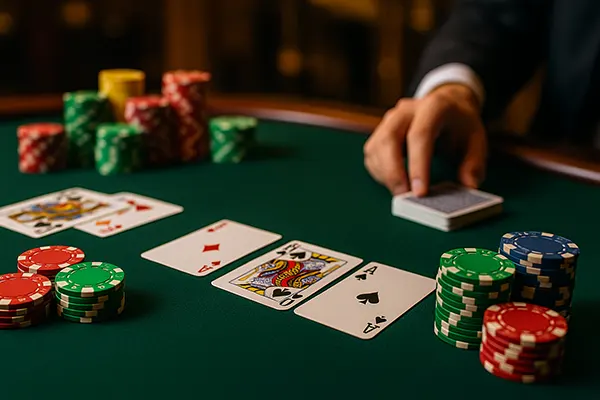Poker in Casinos: Types, Strategies, and Common Player Mistakes

Poker remains one of the most popular and intellectually engaging games available in land-based and online casinos. Its combination of strategy, mathematics, and psychology attracts both casual players and professionals. Understanding the key varieties of casino poker and the mistakes that new players often make is crucial for those who wish to play consistently and responsibly.
Popular Types of Casino Poker
Unlike traditional tournament poker, casino poker pits the player against the dealer rather than other participants. This format has produced several unique variations that are now staples in casinos worldwide. Each version introduces its own pace, rules, and payout structures, giving players different experiences and challenges.
One of the best-known examples is Caribbean Stud Poker. Players receive five cards and compete directly with the dealer. Bluffing is not part of the game, so success depends on understanding probabilities and knowing when to fold or raise. Its simplicity and progressive jackpot options make it attractive to a wide audience.
Casino Hold’em adds a more dynamic feel. It follows the familiar Texas Hold’em format but is simplified for casino play. Players and dealers share community cards, making the game faster and more straightforward while still maintaining strategic depth.
Three Card Poker and Its Distinct Features
Three Card Poker is another popular variation found in most casinos. Instead of five or seven cards, each player and the dealer receive only three cards. The aim is to have a stronger combination than the dealer using basic poker rankings. The speed of play and relatively low house edge have made it a top choice for beginners.
The main advantage of Three Card Poker lies in its transparency. There are no complex decisions or long rounds; the outcome is determined quickly, based on logic and probability. This simplicity is appealing to players seeking shorter sessions or those new to the game.
Despite its simplicity, players still need to make correct mathematical decisions — particularly knowing when to play or fold. A disciplined approach helps reduce losses and prolongs playtime, especially for those learning the fundamentals of poker strategy.
Casino Poker vs Tournament Poker
While both share the same roots, casino poker and tournament poker differ in structure and approach. In tournament poker, players compete against one another until a single winner remains. Success depends on reading opponents, adapting to table dynamics, and managing chip stacks over time.
Casino poker, in contrast, is played directly against the house. The dealer follows fixed rules, so there is no element of psychological battle. Instead, the focus is on mathematical precision and making statistically correct decisions based on the cards dealt and the payouts offered.
This distinction affects both strategy and bankroll management. In casino poker, players can stop at any time, making it more flexible and predictable. Tournament poker, on the other hand, requires patience and endurance, as one bad decision can lead to elimination.
Psychological and Strategic Adjustments
In tournaments, reading the table and identifying player patterns are key skills. Emotional control also becomes a defining factor since long sessions can lead to fatigue or frustration. Players who remain calm and logical under pressure tend to perform better in the long run.
In casino poker, emotions must also be managed, though the triggers differ. The fast pace and frequent small wins or losses can tempt players to increase stakes impulsively. Recognising these emotional cues and sticking to pre-set limits are crucial for maintaining a steady performance.
Ultimately, success in both formats depends on understanding the mathematical basis of poker and applying it consistently, rather than relying on intuition or luck.

Common Mistakes and Responsible Play
Many newcomers to casino poker make predictable mistakes that can easily be avoided. Emotional play is the most common. After a losing streak, players may chase losses by betting more aggressively, often worsening their financial situation. Maintaining self-control and viewing each hand as an independent event helps break this cycle.
Another frequent issue is poor bankroll management. Without a clear spending plan, players risk exhausting their funds too quickly. A practical rule is to set a budget before starting, avoid exceeding it, and track outcomes to identify long-term trends. Responsible gambling practices protect both enjoyment and financial stability.
Finally, neglecting basic strategy is a costly error. Casino poker rewards logical decision-making. Learning hand probabilities, dealer behaviour patterns, and optimal play charts can significantly improve outcomes over time. Investing time in education pays off far more than impulsive betting.
Guidelines for Consistent and Controlled Play
Establishing limits before every session is one of the best ways to stay disciplined. This includes both time and money boundaries. Once either limit is reached, stepping away helps maintain objectivity and prevents emotional decisions.
It is equally important to understand that poker in a casino is entertainment, not an income source. Treating it as such reduces pressure and keeps the experience enjoyable and sustainable. Responsible gaming policies introduced by reputable operators also support this approach.
Regularly reviewing performance, identifying patterns of error, and taking breaks when needed all contribute to long-term stability. A balanced mindset transforms poker from a risk into a rewarding strategic pastime.



